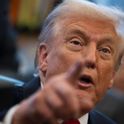A 50 per cent reduction in the nuclear weapons arsenal of Russia and the US was proposed by President Barack Obama this past weekend. President Dmitry Medvedev seems to be receptive. What neither have mentioned, however, is that we have been here before: with presidents Ronald Reagan and Mikhail Gorbachev. And the sorry story of that impasse contains some valuable lessons for present diplomacy.
Although Russia and the US keep their missiles on hair trigger alert, there is almost nobody in the higher reaches of policy making on either side who thinks they would ever be used. Indeed, this has been so for years. Similarly, doubts about reason for the vast number of nuclear weapons in America's stockpile go back a long way. President Dwight Eisenhower, the former Second World War commander in chief, observed that, “military statements of nuclear weapons requirements were grossly inflated.” Robert McNamara, former Defence Secretary for presidents John F Kennedy and Lyndon Johnson, argued that “each individual decision to increase the number of nuclear weapons seemed rational at the time but the result was insane.” Secretary of State Henry Kissinger, whilst negotiating with the Soviet Union in Moscow, said at a press conference, “One of the questions we have to ask ourselves as a country is what in the name of God is nuclear strategic superiority?”
Ronald Reagan was the first American president to break through the murk and horror of the nuclear weapons debate. Many have judged Reagan as a bit of a simpleton. Now, thanks to good biographies on him, we have a more nuanced view. Yes, he wasn't an intellectual but his political instincts were fine tuned and turned out to be right more often than the counsels of his experts. Within his administration it was he who felt the strongest about nuclear abolition. Jack Matlock, Jr., who served as Reagan's principal advisor on Soviet affairs, even said in one interview that he “suspected that Reagan would not retaliate in the event of a Soviet nuclear attack”.
In 1986, Reagan and Gorbachev met in Reykjavik, Iceland, for a summit meeting on arms control. Gorbachev surprised the Americans by declaring at the onset that he wanted an outcome that would lead on to the complete liquidation of nuclear arms. After a couple of days of discussing cuts in European and Asian based missiles, the Anti Ballistic Missile Treaty and offensive strategic systems, Gorbachev asked if Reagan had agreed to his proposal for 50 per cent reductions in strategic offensive missiles. “Yes,” said Reagan. And a day later Reagan made an astonishing proposal: if the two countries found a way to totally eliminate their arsenals, would Gorbachev allow the Americans to put up a space based defence system to deal with rogue nations who might develop nuclear weapons of their own and then attack the US? To this, Gorbachev said “no”.
According to Pulitzer prize winning author, Richard Rhodes, whose latest book, Arsenal of Folly is the best single read on the subject and who has studied the recordings of this conversation, in a crucial last meeting the exchange went like this:
Reagan: It would be fine with me if we got rid of them all [nuclear weapons]. Gorbachev: We can do that. We can eliminate them all. George Shultz (the Secretary of State): Let's do it!But then Gorbachev added a caveat that Reagan would never accept. “If you agree to restrict your research to how a space-based defence system might work to the laboratory then within two minutes I'll be ready to sign the treaty.” Reagan couldn't agree. An hour or so before, Richard Perle, often called the dark eminence of American arms control, persuaded Reagan, against the advice of Schultz and Paul Nitze, his two most experienced advisors, to insist that restricting his space-based defence plan to the laboratory would effectively kill it. Gorbachev told Reagan in ripost, “It is a question of principle. If I return to Moscow and say that I agreed to allow you to test in the atmosphere and in space, they would call me a fool and not a leader.” The implication was that Gorbachev feared being overthrown. Perle's concern was that Congress would never ratify such a deal. Also he didn't trust the Soviets one bit.
Yet, if Perle had supported Reagan, along with such well placed conservatives as Shultz and Nitze, they could have persuaded Congress and at the same time persuaded Reagan to give up a specious concern for a system that even today is just a pipe dream. Gorbachev, for his part, knowing that Reagan's idea would never fly, should have compromised too. What fools they both were, and now we must start all over again.












